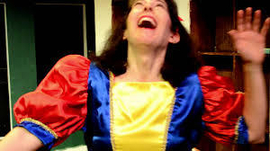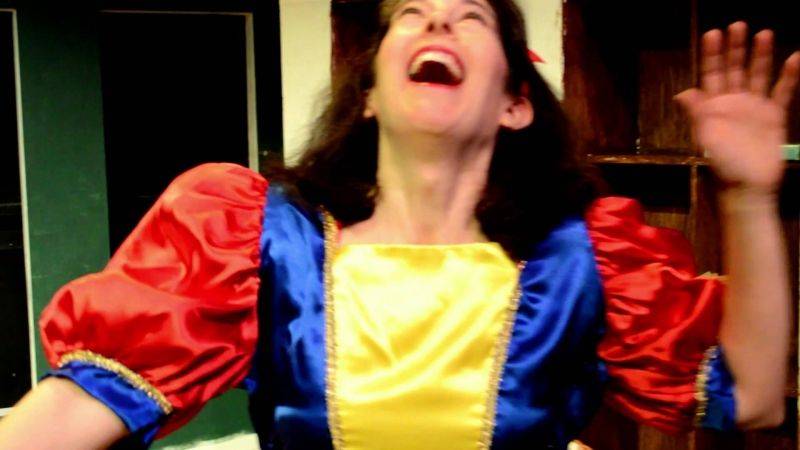
Christopher Durang was one of the first playwrights I saw in the flesh. Well, to be precise, he was on Saturday Night Live assisting host Sigourney Weaver, an old college chum of his, in a colorful ditty the pair had written for the occasion. He was round and cheerful and a wee bit gay, just like me. Seeing him made me smile; he was accessible and relatable, and if I dreamt enough and worked hard enough, maybe I could be him one day. Plus, he was the first playwright whose works I’d heard of who wasn’t long dead. Sure Shakespeare is groovy, but not quite accessible to a kid from the cornfields; and Tennessee Williams was a batty old booze-soaked queen by the time I saw him, regaling the occasional talk show host with tales of his misspent youth long after his writing skills had escaped him. Christopher Durang (pictured below, left) was the first working playwright I’d ever seen, and that gave me hope.
 So I was thrilled when I heard that the Celebration Company would be mounting Durang’s latest Tony award-winning comedy, Vanya and Sonia and Masha and Spike, at The Station Theatre. The 2013 Broadway production also won Outstanding Play from the Drama Desk Awards and the New York Drama Critics Circle Awards, along with several Off-Broadway awards in its 2012 Off-Broadway run. The play boasts the absurdist flair of Durang’s earlier works (The Actor’s Nightmare, Sister Mary Ignatius Explains It All for You, and Beyond Therapy), but with a more positive and upbeat resolution.
So I was thrilled when I heard that the Celebration Company would be mounting Durang’s latest Tony award-winning comedy, Vanya and Sonia and Masha and Spike, at The Station Theatre. The 2013 Broadway production also won Outstanding Play from the Drama Desk Awards and the New York Drama Critics Circle Awards, along with several Off-Broadway awards in its 2012 Off-Broadway run. The play boasts the absurdist flair of Durang’s earlier works (The Actor’s Nightmare, Sister Mary Ignatius Explains It All for You, and Beyond Therapy), but with a more positive and upbeat resolution.
As you can probably guess from its title, the play is a modern takeoff of Chekhov plays and characters, but as stated by The Station production’s director, Rick Orr, “one does not need to know all the Chekovian references to appreciate the play. It a madcap play about a family and their individual struggles to connect” while debating the possible sale of the family home. The play has recognizable stock characters thrown into a family structure: the would-be young actress obsessed with her own press; the handsome, scantily clad young man whose acting talents are questionable; the dimwitted siblings at the mercy of their actress sister; and a soothsayer who echoes the Greek chorus component of classical drama…all blathering on as we learn about family dysfunction, survival, and love. The humor comes from both the absurdity of its characters and the recognizable components of their triumphs and struggles.
I sat down (at my computer, as one does these days) for a chat with the production’s director and cast about this fresh-from-New York piece and their local production. Rick Orr, the Artistic Director of The Celebration Company at The Station Theatre has directed upwards of 100 productions for the company. His credits include last season’s successful mounting of the musical Next to Normal as well as Harold Pinter’s Betrayal, Yasmina Reza’s God of Carnage, and a stunning production of John Logan’s Red.
———
Smile Politely: This is a very recent Broadway offering. Why did this script intrigue you, and how did you pursue the piece for The Station?
 Rick Orr: Vanya only became available for amateur productions late summer after several groups had already set their seasons, so we are among the first to be doing an amateur production of this piece. I saw the play before it closed on Broadway and was taken by the unique style of this modern comedy that draws on Chekov characters and plot, but in a very modern way.
Rick Orr: Vanya only became available for amateur productions late summer after several groups had already set their seasons, so we are among the first to be doing an amateur production of this piece. I saw the play before it closed on Broadway and was taken by the unique style of this modern comedy that draws on Chekov characters and plot, but in a very modern way.
SP: This play has won many awards for Christopher Durang. What makes this piece so much fun, and how does it compare to other Durang works?
Orr: This is my first outing on a Durang play, and I have directed over 100 plays and musicals. Unlike earlier Durang works, Vanya ends on an upbeat future for the characters. There is hope at the end of the play. Another aspect that differs from Durang’s previous works is his referential use of classic works to make a narrative point. Vanya is a comedy that draws on Chekov characters and plot, but one does not necessarily need to know those references to enjoy the play.
SP: What makes this play a good fit for The Station’s current season? How have you had to adapt this piece for the space and budgetary constraints of a Station production?
Rick Orr: This work is good fit for the Station because it has a smaller cast with various age ranges, and while it could have a very, very elaborate stage setting, the piece can also be done with a simpler set design, and still retain the essence of the play. Thus, with a limited budget for set and costume designs, groups like ours can still do the work justice.
———
As an additional treat for this production, I rounded up the entire cast over email and asked them about their experience with the work. This eclectic group of actors have quite an array of accomplishments. Gary Ambler (Vanya) is a founding member of The Celebration Company and still serves on its board of directors. As a director, he has helmed many productions, including Sons of the Prophet and A Steady Rain. As an actor, he appeared as Sigmund Freud in last summer’s production of Freud’s Last Session as well as seminal Orr productions such as Red and Equus.
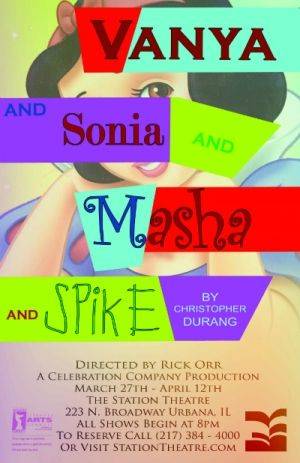 Jacklyn Loewenstein (Masha) is relatively new to the C-U theatre scene and is doing her first production at The Station. She has directed locally for CUTC (The Putnam County Spelling Bee) and was featured in local productions of The Music Man and Pinkalicious. She has also appeared in productions of Applause and Grease with The Theatre on the Lake in Chicago.
Jacklyn Loewenstein (Masha) is relatively new to the C-U theatre scene and is doing her first production at The Station. She has directed locally for CUTC (The Putnam County Spelling Bee) and was featured in local productions of The Music Man and Pinkalicious. She has also appeared in productions of Applause and Grease with The Theatre on the Lake in Chicago.
Barbara Ridenour (Sonia) is a Station Theatre board member with a long history of theatrical contributions to the community, both as a retired educator at Uni High and as an actor and director in community productions. Ridenour has appeared in numerous Station productions, including Death of a Salesman, Noises Off, and The Glass Menagerie, in which she played the delicate Laura.
Maxwell Tomaszewski (Spike) is a C-U native who has appeared in numerous Station productions, including this season’s productions of Come Back Little Sheba and Good Boys and True. Max has also appeared in a production of The Changeling at The Long Beach Playhouse in California.
Lindsey Gates-Markel (Nina) is a fixture on The Station’s stage, appearing most recently in last season’s productions of Hamlet and Or,.
Shawna Smith (Cassandra), another Station board member, has worked behind the scenes on numerous Station productions. She has been making more frequent on-stage appearances lately, though, including this season’s production of White People
I was excited to hear from an entire ensemble about their experiences with this production.
———
SP: What is the most enjoyable part of creating your character?
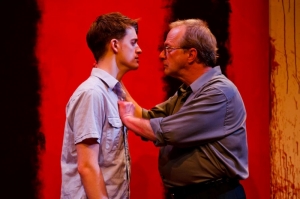 Gary Ambler (pictured, right, in Red): It’s comedy. What’s enjoyable is working through the intricacies of the joke: the timing, the reaction, the take. And layering that with Durang’s oddball worldview. It’s fun to puzzle it out. Vanya has deep roots in the character in Chekhov’s play; and, having played Uncle Vanya many years ago, it’s been interesting and enjoyable to explore them again.
Gary Ambler (pictured, right, in Red): It’s comedy. What’s enjoyable is working through the intricacies of the joke: the timing, the reaction, the take. And layering that with Durang’s oddball worldview. It’s fun to puzzle it out. Vanya has deep roots in the character in Chekhov’s play; and, having played Uncle Vanya many years ago, it’s been interesting and enjoyable to explore them again.
Jaclyn Loewenstein: As a self-indulgent, insecure drama queen, Masha gets to behave in ways that would not be socially acceptable in my world. I enjoy her passive-aggressive sense of humor and her freedom to manipulate, condescend, and kiss whomever she pleases.
Maxwell Tomaszewski: Spike is an absurd mix of blissful ignorance and playful curiosity. It has been a real joy exploring Spike’s stupidity as well as his charm. Playing this type of character allows the actor to have a lot of fun clowning on stage. He embodies a specific type of silliness that I believe few roles present. I am having a great time exploring that.
Barbara Ridenour: Sonia is a typical Chekhovian character in that she is in “mourning for her life.” She’s fun to play with all her misery and complaining. One just has to root for the poor girl.
Shawna Smith: My character appears crazy. I mean she’s not—it’s the prophecies running through her head 24/7 that make her seem so. But because she has that edge of crazy and she delivers these long outlandish speeches, I’m getting to really experiment with making this character a little over the top in a fun way.
Lindsey Gates-Markel: Playing Nina’s joy. She just thinks life is the most beautiful romp and that the world is full of hope—which it is. So I get to gaze lovingly at everyone around me and encourage them and be charmed by them. It’s not a bad place to be.
SP: What is the biggest challenge in creating your character?
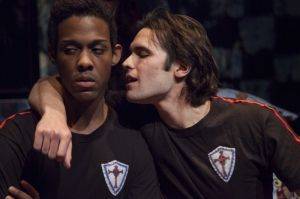 Tomaszewski (pictured, left, in Good Boys and True): The biggest challenge has been pulling so much action and material out of such a shallow character. Durang does not provide a lot of depth or back story for Spike. It’s simply not necessary to the character or relevant for the intentions of the script. But I have traditionally been drawn to more layered and complex characters, so it is an excellent challenge to play Spike and step away from all of that.
Tomaszewski (pictured, left, in Good Boys and True): The biggest challenge has been pulling so much action and material out of such a shallow character. Durang does not provide a lot of depth or back story for Spike. It’s simply not necessary to the character or relevant for the intentions of the script. But I have traditionally been drawn to more layered and complex characters, so it is an excellent challenge to play Spike and step away from all of that.
Ridenour: Making her believable and sympathetic and not just a two-dimensional type.
Gates-Markel: I think her hopefulness is a choice (and a brave one), not a default shallow innocence. So I’ve got to manage to make her thrilled by everyone and in love with everything without being the total worst.
Ambler: Keeping it light. Keeping it loose. Keeping it anarchic.
Loewenstein: I don’t really know what it feels like to be a world-renowned movie star, famous for portraying a nymphomaniac serial killer.
Smith: Making this character over the top in a fun way… I want to go big, but not just silly for silly’s sake. It’s a fine line, and I’m trusting Rick to let me know when I’ve gone too far. The other big challenge is deciphering what she’s saying. I have these three Greek-esque tragedy speeches, and decoding those has had its challenges.
SP: Why do you think audiences will enjoy in Vanya and Sonia and Masha and Spike?
Ambler: I suspect those familiar with Chekhov will have a slightly different experience of the play, though I don’t think that familiarity is necessary to enjoy it. I hope it will be light and absurd, surprising and ridiculous.
Loewenstein: I think they’ll enjoy meeting this bizarre assortment of characters, each with a very different perspective on life, goals, and regrets.
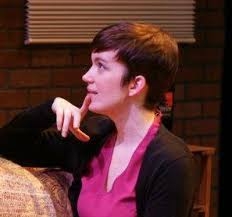 Gates-Markel (pictured, right, in Becky Shaw): We’ve got Gary Ambler in a Disney costume, and Max Tomaszewski beat-boxing in his underwear. What more could you people want?
Gates-Markel (pictured, right, in Becky Shaw): We’ve got Gary Ambler in a Disney costume, and Max Tomaszewski beat-boxing in his underwear. What more could you people want?
Ridenour: It’s a quirky comedy. Although it’s not Chekhov, Durang creates characters that make you laugh but who have serious undertones.
Smith: Lindsey already talked about Max in his underpants, right? Well, beyond that the show really is quite funny.
Tomaszewski: Katherine Quin—the production dramaturg—states that the purpose of this play is “to make us laugh.” I completely agree with her assessment, and I think it is first and foremost the humor of this show that the audiences will enjoy. It’s a laughing-out-loud experience that people don’t necessarily associate with live theatre. I think that theatre lovers will adore the show’s energy and wit, and even non-theatre aficionados will be delighted and surprised. And stop talking about my underwear, you guys!
———
Whether you’re looking for a chance to explore variations on the works of Anton Chekhov or just want to laugh for the sake of laughing, Vanya and Sonia and Masha and Spike may just have what you need for a night out. And underwear. To reserve your seat for this comedy, visit the Station website or call 217-384-4000. The play opens Thursday, March 27th, and runs three weeks.
Editor’s note: Thursday, March 27, is sold out.








